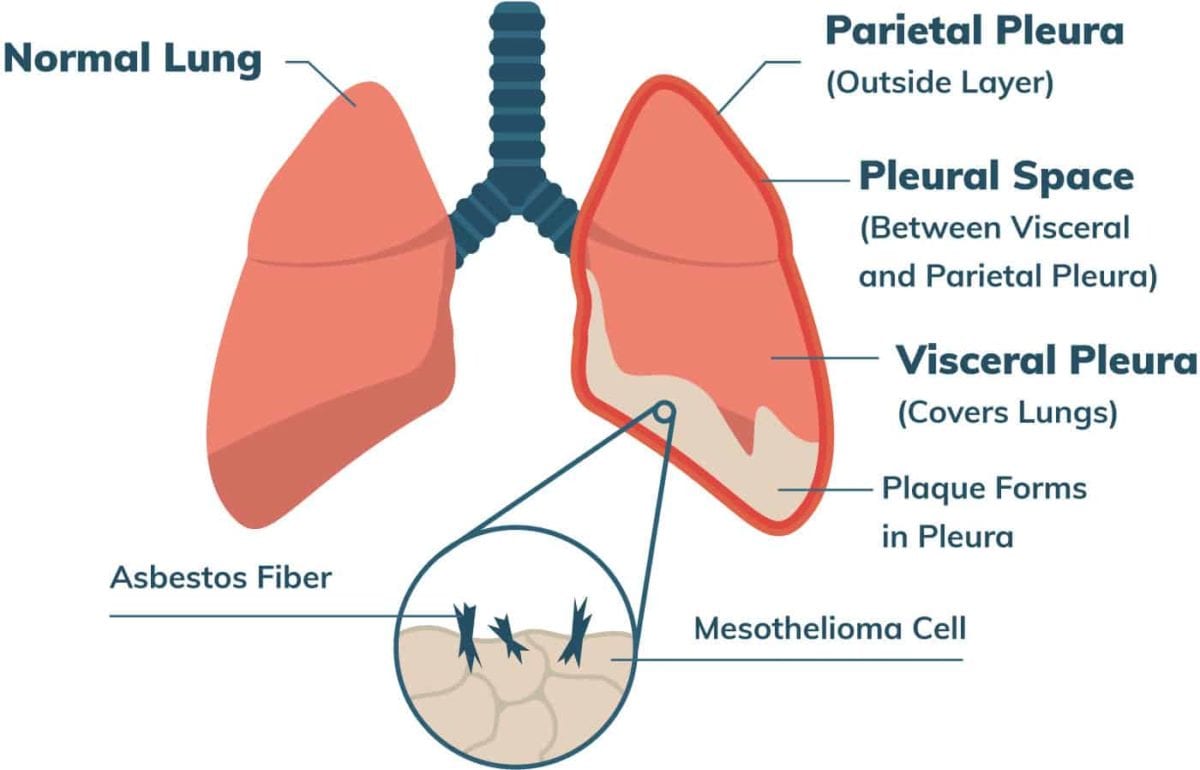It’s important to know the facts about malignant mesothelioma, in order to avoid risk factors and recognize early symptoms.
What is Mesothelioma?
“Malignant mesothelioma is a rare and aggressive cancer that develops in the linings of the lungs, abdomen, heart or testes.” (Mesothelioma.com) The only known cause of mesothelioma is exposure to asbestos.
Mesothelioma is misunderstood by many. For years, diagnosis and awareness of mesothelioma has been challenged due to common misconceptions that have been spread.
Who gets mesothelioma?
Statistics have led people to believe that ONLY elderly men can develop mesothelioma. While it’s true that over 75% of deaths due to mesothelioma are men, most of whom are past middle-age, this aggressive cancer can affect anyone, men or women, of all ages.
The main reasons older men have made up the majority of mesothelioma deaths:
- The industries that expose workers to asbestos, mills, mining, automobile repair, construction, have been positions filled mostly by men.
- Age-wise, “there is a long latency period for mesothelioma symptoms.” (https://www.mesothelioma.com/mesothelioma/latency-period/) Symptoms may not start until 10 to 50 years after exposure.
Facts:
Men and women are susceptible to mesothelioma. Some forms of mesothelioma are even more common in women: for example, papillary mesothelioma and cystic mesothelioma.
Young adults and children have also been diagnosed with mesothelioma
Is Mesothelioma lung cancer?
The most common form of the cancer, malignant pleural mesothelioma affects the lining of the lungs. Although it is pleural-based and does have some of the same symptoms as lung cancer, the two diseases are very different. Misdiagnosis could lead to the wrong treatment plan and hindered progress.
Facts:
- Mesothelioma develops in the lung linings, while lung cancer forms in the lung tissues.
- Mesothelioma is only known to be caused by asbestos. Lung cancer, on the other hand, can be caused by smoking, air pollution, or asbestos, among other factors.
- Mesothelioma is normally more difficult to treat than lung cancer.
- Mesothelioma has a lower median survival rate than lung cancer.
Are the symptoms of mesothelioma easily recognizable?
There are many common symptoms of mesothelioma that we can look out for:
- abdominal pain and swelling
- chest pain
- coughing
- fatigue
- muscle weakness
- unexplained weight loss
But, sometimes symptoms don’t show up until years after exposure. This makes it harder to diagnose early, thus hampering early treatment. For this reason, it’s important to immediately seek medical attention when recognizing any noticeable mesothelioma symptoms or health abnormalities.
Facts:
The earlier symptoms are detected, the better the prognosis. Sometimes no symptoms show up for 10 to 50 years after initial exposure to asbestos. Understanding potential risk factors is essential for early detection.
Is mesothelioma contagious?
The first question asked when someone develops a dangerous disease is whether or not it’s contagious. Mesothelioma is not contagious. There are, however, genetic risk factors that can make individuals more susceptible to developing the disease. Also, secondary exposure needs to be taken into consideration.
Facts:
- Mesothelioma is not contagious.
- Heredity, such as mutation of the BAP1 gene can cause genetic risk factors.
- Secondary exposure, by workers bringing asbestos fibers home on their clothes can cause the development of mesothelioma in family members.
How much asbestos exposure causes mesothelioma?
Although those who are exposed to asbestos long-term have a better chance of succumbing to mesothelioma, even small amounts of exposure to asbestos can cause and increase the likelihood of developing the disease. There are also a variety of factors, including overall health, age, and duration of exposure that can make individuals more susceptible to diagnosis.
Facts:
Any amount of exposure to asbestos can cause mesothelioma. “The more an individual is exposed to asbestos, the more likely they are to develop mesothelioma.”
Secondary exposure can also cause mesothelioma.
Were companies aware that they were exposing employees to asbestos?
It’s hard to believe that employers would knowingly put their workers in danger, at the risk of developing diseases such as mesothelioma, lung cancer, asbestosis, etc., but some did. In many cases, victims are eligible to receive compensation for pain and suffering, along with mounting medical bills.
Facts:
“Occupational exposure is the leading cause of asbestos exposure.” Some companies knowingly put employees at risk for exposure to asbestos. Victims may be eligible for compensation from their employers.
Should suspected asbestos be removed immediately?
Asbestos is known to be dangerous, and can cause harm in the workplace, at home, or in schools. This makes people think it needs to be removed immediately. However, since asbestos IS so dangerous, it must be handled by an asbestos removal specialist.
Facts:
“When asbestos is disturbed, fibers become airborne and are easily inhaled or ingested, potentially causing mesothelioma.” A specialist should always be brought in, even if asbestos is only suspected.
Asbestos fibers in the air cannot be detected. They don’t cause any noticeable effects as far as smell, feel, or breathing troubles.
Has asbestos been banned?
Hopefully, this will happen soon, with the continued awareness of asbestos and all of the hazards it presents. At this time, however, “laws and regulations have been put into place to limit the potential of asbestos exposure.” Unfortunately, it is still found in older homes built before 1980, and in workplaces and public areas. Asbestos is still being found in products that are used today.
Facts:
To date, attempts have been made to fully ban asbestos, but they have been overturned. More than 60 countries have banned asbestos, and more have committed to ban it. Asbestos is still present in older homes, schools, workplaces, and products.
EPA’s “Final Rule”
The U.S. Environmental Protection Agency (EPA) is still working on totally eliminating asbestos in the United States. They recently announced the “final rule” issued under the Toxic Substances Control Act (TSCA). “The rule requires asbestos manufacturers – such as importers and processors – to report use and exposure information from the past four years, including information on asbestos-containing products.”(MesotheliomaGuide.com) The EPA plans to use this information for future actions – possibly a complete ban – on asbestos.
“Currently, the Ban Asbestos Now Act is in both the House of Representatives and Senate. It would outlaw all commercial mining, production and sale of asbestos within one year of passage. Activists are hopeful for its passing…” (MesotheliomaGuide.com)
Hopefully, these facts about malignant mesothelioma will help ensure early detection and a longer life expectancy.
Mesothelioma Lawyer David L. Hood – Representing Mesothelioma Victims across South Carolina
The Law Offices of David L. Hood and co-counsel have been fighting for the rights of injured mesothelioma victims (and their families) in North Myrtle Beach, Myrtle Beach, Murrells Inlet, Georgetown, Charleston and all across South Carolina for over 30 years. We have a dedicated team that will strive to take care of your claim professionally and treat you with respect. Over the years we’ve represented thousands of disabled & injured workers, working hard to get them the medical treatment and compensation they deserve. If you or a family member has suffered from primary or secondary exposure to Mesothelioma or just have questions about a possible case, let us know. We’re here to help.
To learn more about what we can do for you and to get answers to your questions, contact one of our locations to set up a free initial consult. If you choose to work with us, we will handle your case on a contingent fee basis, which means you pay nothing unless we make a recovery for you. To get in touch with us, you can call our offices at (843) 491-6025 or email us here. We’re available 24/7 via chat, phone, email or text. You have questions – we have answers: Contact The Law Offices of David L. Hood today!





